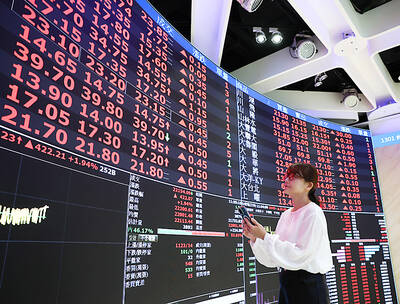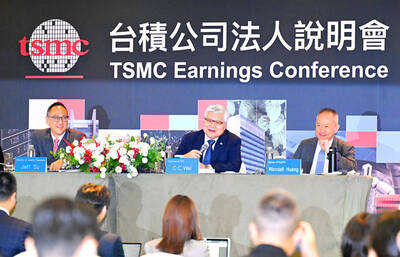Taiwanese businesses are exploring opportunities in the Indian domestic market as 180 companies, including five Indian firms, showcase their products at 240 booths at this year’s TAITRONICS India.
This represents growth of nearly 130 percent and 116 percent respectively in the number of exhibitors and booths, compared with last year’s show, organizer Taiwan External Trade Development Council (TAITRA, 外貿協會) said yesterday after opening the three-day trade show in Chennai, India.
By noon, around 450 corporate visitors and buyers had visited the business-to-business industrial trade show, it added.
Some US$100 million in deals could be closed at the show to add to the annual trade volume between Taiwan and India worth US$620 million, Ong Wenchyi (翁文祺), Taipei Economic and Cultural Center (TECC) representative in New Delhi, said on the sidelines of the trade show yesterday.
“Growth potential [for Taiwanese businesses] could rocket in coming years,” he said. “The Indian market has shown no signs of contracting in the next decade.”
Electronic machinery, public infrastructure and agricultural reprocessing businesses stand a better chance of benefiting from the growth in the Indian domestic market, Ong added.
The de facto ambassador also boasts the fine quality of Taiwanese machine parts at a price 10 percent lower than those of Japanese or German competitors.
Bilateral trade between Taiwan and India has expanded substantially since 2007, when an investment protection agreement was inked to provide protection and official assistance to businesses from both countries. Meanwhile, a double-taxation relief agreement is under negotiation and likely to receive approval from the two sides by early next year, Ong said.
M. F. Farooqui, principal secretary of the industries department in the government of Tamil Nadu, urged Taiwanese businesses to join South Korean and Japanese counterparts in establishing a presence in India.
To facilitate Taiwanese business, he told the trade show’s opening ceremony that his government is prepared to provide between 100 hectares and 150 hectares of land as an industrial park for Taiwanese companies.
“I assure you a responsive and transparent government,” he said.
Unfamiliar with the Indian market, first-time exhibitors from Taiwan yesterday said that they need to run more feasibility studies before committing to it.
Sijhih (汐止), Taipei County-based Zeeman Industry Co (錦慈企業) yesterday said that if the fuse-making company can attract business from Indian auto part distributors supplying big brand manufacturers such as Hyundai Motor Co and Toyota Motor Corp, it would set up a factory in India soon, company general manager James Cheng (鄭金池) told the Taipei Times yesterday.
“[My] initial investment here may exceed US$3 million,” he said.
Executives from tube-maker Chi Bin Machine Co (奇賓機械) and niche computer manufacturer Twinhead International Corp (倫飛電腦), said that they hope to locate Indian buyers for export business.
To Indian buyers, however, pricing could be a concern although most of them agreed that Taiwan-made products are of better quality than locally manufactured equivalents.
C. Naveen Kumar, purchasing manager of Dynamic Research Systems, said that he found Taiwanese IT networking products are “20 percent more expensive than he expected.”
He added a solution will need to be found for the pricing concerns before local buyers would place orders.
A. Stephenraj, business development manager of Pee Pee Appliance Private Ltd, said his company is searching for advanced consumer electronic products such as LCD TVs or handsets to cater to local customers.
If Taiwan-made products meet requirements, pricing could be less of a concern, he added.

UNCERTAINTIES: Exports surged 34.1% and private investment grew 7.03% to outpace expectations in the first half, although US tariffs could stall momentum The Chung-Hua Institution for Economic Research (CIER, 中華經濟研究院) yesterday raised its GDP growth forecast to 3.05 percent this year on a robust first-half performance, but warned that US tariff threats and external uncertainty could stall momentum in the second half of the year. “The first half proved exceptionally strong, allowing room for optimism,” CIER president Lien Hsien-ming (連賢明) said. “But the growth momentum may slow moving forward due to US tariffs.” The tariff threat poses definite downside risks, although the scale of the impact remains unclear given the unpredictability of US President Donald Trump’s policies, Lien said. Despite the headwinds, Taiwan is likely

READY TO BUY: Shortly after Nvidia announced the approval, Chinese firms scrambled to order the H20 GPUs, which the company must send to the US government for approval Nvidia Corp chief executive officer Jensen Huang (黃仁勳) late on Monday said the technology giant has won approval from US President Donald Trump’s administration to sell its advanced H20 graphics processing units (GPUs) used to develop artificial intelligence (AI) to China. The news came in a company blog post late on Monday and Huang also spoke about the coup on China’s state-run China Global Television Network in remarks shown on X. “The US government has assured Nvidia that licenses will be granted, and Nvidia hopes to start deliveries soon,” the post said. “Today, I’m announcing that the US government has approved for us

The National Stabilization Fund (NSF, 國安基金) is to continue supporting local shares, as uncertainties in international politics and the economy could affect Taiwanese industries’ global deployment and corporate profits, as well as affect stock movement and investor confidence, the Ministry of Finance said in a statement yesterday. The NT$500 billion (US$17.1 billion) fund would remain active in the stock market as the US’ tariff measures have not yet been fully finalized, which would drive international capital flows and global supply chain restructuring, the ministry said after the a meeting of the fund’s steering committee. Along with ongoing geopolitical risks and an unfavorable

DEMAND: The forecast did not factor in potential increases from lifted US restrictions on Nvidia’s H20 chips to China, which TSMC CEO C.C. Wei described as ‘good news’ Taiwan Semiconductor Manufacturing Co (TSMC, 台積電), a major chip supplier to Nvidia Corp, yesterday raised its revenue growth forecast for this year to 30 percent in US dollar terms, thanks to exceptionally strong demand for artificial intelligence (AI) and high-performance computing (HPC) applications. The new revenue growth forecast surpasses the 25 percent expansion estimated by TSMC three months ago and beat almost all industry analysts’ expectations. Booming AI demand helped propel the chipmaker’s net profit by 60.7 percent last quarter to a record high of NT$398.27 billion (US$13.54 billion), from NT$247.85 billion a year earlier. That represented a sequential increase of 10.2